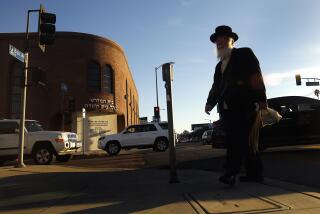Threat Prompts Tighter Airport Security : Travel: U.S. cites fear of terrorist attack, particularly in New York area, connected with the recent arrest of Mideast militant and sheik’s trial.
- Share via
NEW YORK — A threat of a terrorist attack by Middle Eastern militants--possibly a “suicide massacre”--had the New York area’s three major airports under unprecedented security Monday. Other airports, including Los Angeles International, were asked to take extra precautions.
Travelers at Kennedy, LaGuardia and Newark airports were subjected to the tightest security, but a Department of Transportation official in Washington said major airports nationwide are being directed to review their screening procedures “based upon information provided by law enforcement and intelligence agencies.”
Federal officials said the heightened security resulted from information that a terrorist attack, such as a car bombing, might be directed at a New York-area airport by two militant groups, the Palestinian Hamas and the Iranian-backed Hezbollah.
Law enforcement sources said the groups might be plotting retaliation for the recent arrest at Kennedy Airport of Mousa Abu Marzuk, a fund-raiser for Hamas who may be deported to Israel. Hamas has denounced the arrest as “serious and provocative,” saying it would hold the Clinton Administration “fully responsible.”
Federal sources also have been concerned about violence coinciding with the 7-month-old terrorism trial of Egyptian Sheik Omar Abdel Rahman and 10 associates, which is nearing completion in New York.
Los Angeles International Airport had tightened security last week on federal orders in response to general bomb threats, but has not taken additional precautions, spokeswoman Nancy Niles said Monday. More uniformed security officers are patrolling the airport and parking lots, travelers are being asked to show photo identification at check-in, and airport personnel are watching for unattended bags and cars, Niles said.
The government is asking airline passengers nationwide “for their understanding and cooperation during the period of increased security,” the Transportation Department official said.
“All travelers are encouraged to be on the alert for any suspicious, unattended bags, parcels and other items, and passengers may be required to answer questions about their luggage,” he added.
No major flight delays were reported because of heightened screening procedures in New York. Some parking facilities adjacent to terminals were closed, and police would not permit waiting automobiles to be left unattended. Some vehicles were randomly searched.
Passengers were not allowed to check their luggage at curbside, the first such restriction since tighter security was imposed during the 1991 Persian Gulf War. Only passengers carrying tickets were granted access to international departure areas.
At Kennedy’s United Air Lines terminal, Julie Stevenson, a San Francisco teacher, said travelers did not seem unduly concerned and were moving rapidly through security checkpoints.
“I’m frankly glad to see all the extra security,” Stevenson said. “I’d like to know that the airlines are keeping their eyes open to any possible threats.”
Courtney Hopkins, 19, a student flying home to Los Angeles after six weeks in Italy, said she “was a little worried there would be long lines here, but there aren’t any.”
The stepped-up airport screening follows on the heels of new security measures throughout the government since the April 19 bombing of the Alfred P. Murrah Federal Building in Oklahoma City.
Most noticeable has been the increased protection for U.S. Atty. Gen. Janet Reno based on “a few” threats that were regarded as “credible and specific,” a federal source said.
Providing more protection for Reno has been especially difficult because she originally cut back on security details assigned to her two Republican predecessors and took delight in walking to work from her nearby apartment.
Now, however, FBI agents often enter her conference room when reporters gather for her weekly briefings.
The building itself is no longer easily entered. Even those who are admitted through a special key-card gate sometimes have to show their credentials in the hallways.
Across the Potomac River at the Drug Enforcement Administration headquarters, security specialists initially closed off a special parking area in front of the building and began checking vehicles left unattended on the street at the rear of the DEA building.
Jackson, a Times staff writer, reported from Washington and Olen, a special correspondent, reported from New York. Times staff writers Ronald J. Ostrow in Washington and Stephanie Simon in Los Angeles also contributed to this story.
--- UNPUBLISHED NOTE ---
In some 1997 stories, and stories from 2001 onward, Mousa abu Marzuk is referred to as Mousa abu Marzook.
--- END NOTE ---
More to Read
Sign up for Essential California
The most important California stories and recommendations in your inbox every morning.
You may occasionally receive promotional content from the Los Angeles Times.













